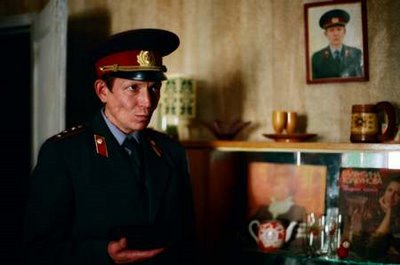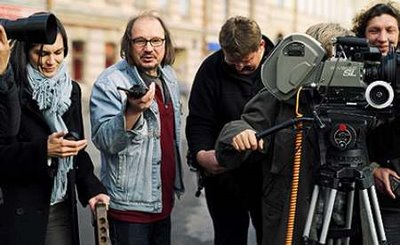 Back to selection
Back to selection
Alexei Balabanov, Cargo 200
Though he only decided he wanted to be a filmmaker in his late twenties, Alexei Balabanov has made up for lost time by creating a body of work that has made him both Russia’s most interesting auteur and one of its most commercially successful directors. Born in Sverdlovsk in 1959, Balabanov studied translation at the Gorky Pedagogical University and then spent a few years working as an interpreter for the Russian Army in the Middle East and Africa. It was only at the age of 28 that he signed on to attend the Advanced Course for Screenwriters and Directors in Moscow, where he studied auteurist cinema. Graduating in 1990 with a couple of student documentaries to his name, Balabanov made his feature debut as writer-director with Happy Days (1991), and next brought to the screen an adaptation of Franz Kafka’s The Castle (1994). He had his breakthrough in 1997 with the crime drama Brother, which was a phenomenal success in Russia and internationally, but he surprised many by following it up with an arty, black-and-white depiction of the roots of pornography in pre-revolution era Russia, Of Freaks and Men (1998). After thus reasserting his auteur status, he satisfied the masses with Brother 2 (2000) – once again a monster hit – and then made a return to more profound works with War (2002), a drama about prisoners in the Chechen conflict. His two subsequent films, the raucous gangster comedy Dead Man’s Bluff (2006) and romantic melodrama It Doesn’t Hurt (2006), were the first efforts of his career that he did not write as well as direct.
Cargo 200, Balabanov’s new film, is possibly his most personal yet. Set in provincial Russia in 1984 – when the USSR, at war in Afghanistan, was crumbling as the Communist era came to an end – it is partly based on the director’s own experiences at the time. The title refers to the dead soldiers sent back from Afghanistan, and death and decay are everywhere as Balabanov uses the story of the abduction of a local politician’s daughter to give a panoramic view of a country slowly rotting, inside and out. Cargo 200 is an extreme vision, a scathing allegorical satire which starkly depicts the corruption and depravity of its subjects, yet Balabanov presents these grim lives with a stealthy relish that makes the film unexpectedly enjoyable to those who can tap into his sinister, deadpan humor. A grotesque modern farce fueled by vodka, depravity and dodgy 80s pop music, Cargo 200 features one of the most memorable closing shots in recent memory and is the audacious and brilliantly realized vision of a director at the very height of his powers.
Filmmaker interviewed the typically concise Balabanov over email and asked him about his depiction of the Soviet Union in decline, his personal take on cinema, and what he thinks about his status as a “genius.”
Filmmaker: At the start of Cargo 200, it says the movie is based on real events. How did you find out about these events, and how closely do you stick to the truth?
Balabanov: In 1983 I served in the army in transport aviation and we were attached to the landing force division who went to Afghanistan and came from there. I flew to Afghanistan myself. We took soldiers there and also brought dead bodies back. I lived in the barracks with a man who had a lot of war experience and he told me a lot of stories. For example that dead bodies very often disappeared and there was no real control about their transportation back home. That is how the image of the stolen dead soldier’s body came to my mind.
In 1984 when I came back from the army I started working at Sverdlovsk Film Studios as a
director’s assistant and I was assigned to the film crew of the film The Way to the Sunrise about Russia conquering Alaska. I traveled through a big part of Russia looking for locations. I met a lot of Yakut people. Germans. I lived with them, listened to their stories. There is a lot of my imagination in the film but real stories are the base of the film.
Filmmaker: How personal is this film to you? What are your recollections of that period of the 1980s influenced the film? How much did they creep into the film?
Balabanov: In 1984 it was the end of Soviet Union: Chernenko, the old sick leader died, Gorbachev came to power, new era started. The film is very personal. I wanted to tell the story which I was the witness of.
Filmmaker: What was your impetus for writing the film? Was it to counteract nostalgia for Communist era? (If so, do you feel Putin is responsible for the fond feelings of this period?)
Balabanov: I am 49 years old. I was born in the Soviet Union. There is no nostalgia for that time. And Putin has nothing to do with it. I just showed the life of people how I remember it.
Filmmaker: How easy was it for you to recreate the look of the 1980s in the film?
Balabanov: I remember the people, the events very clearly. I work with the same crew all the time, the art director, the costume designer (my wife) are very professional not young people, who also remember that time. Besides we shot the film in the province, here the atmosphere has not changed much. We did not have to build anything special, we shot in a communal apartment (home of the policeman in the film) which did not require special decoration.
Filmmaker: Your actors have a very deadpan style. Do you have particular methods to get them to act in such a way?
Balabanov: I give very exact instructions to the actors, I ask them to be very natural. I very often prefer non professionals. For example the mother of the policeman is played by a common woman who lived in the communal apartment where we shot these scenes.
Filmmaker: How do you describe Cargo 200 to people? Is it a comedy? A melodrama? A thriller?
Balabanov: I cannot define the genre of the film, I do not think you can place it in a certain genre.
Filmmaker: The film has a very dark sense of humor. Do you feel you are more able to make a point with a joke?
Balabanov: I have a sense of humor and I use it very often, but I do not think there is any humor in this film.
Filmmaker: How does the content of the film relate to contemporary Russia? Is there a lesson you hope people will take from it?
Balabanov: I did not think about the present contemporary Russia when making this film, but critics and audience saw allusions to today’s situation. It was not my intention. But films give space to interpretation, which sometimes surprise me. I am not a teacher and it is not my task to teach people any lessons.
One of my favourite films is Old People Do Not Live Here Anymore [the Russian title of No Country for Old Men] by the Coen brothers. What lesson does it teach people? Evil wins at the end and is not punished. Directors who are artists just tell stories, sometimes people make conclusions and interpret the films in their own way. Especially if films make an emotional impact on the audience.
Filmmaker: Is there are a certain group of people you were trying to reach with this film?
Do you think of yourself as an international filmmaker when you are making your movies?
Balabanov: I do not make films for myself. I make them for people and I want people to like my films. I do not make films for any group of people or only for Russians.
Filmmaker: Are audiences meant to enjoy Cargo 200? Or would you prefer that it disturbs them and gets under their skin?
Balabanov: I make shocking films and usually my films are either liked or hated. There are no indifferent viewers.
Filmmaker: How important is this film in terms of your career as a whole?
Balabanov: Each film I make is important for me, I do not do anything else beside making films. It is my life.
Filmmaker: After the huge success of Brother, you made Of Freaks and Men, which was a vastly different film. Did you feel a need to respond to that success on your own terms?
Balabanov: Of Freaks and Men was conceived and written before Brother, but it was the more expensive project so I made Brother, which cost very little ($300,000) before the producer was ready to finance Of Freaks and Men.
Filmmaker: You seem to enjoy confounding people’s expectations and constantly redefining yourself. Do you think that’s a duty of the filmmaker?
Balabanov: I make different films because people like different films.
Filmmaker: Violence is a big part of some of your films. How important is it in your cinematic vocabulary?
Balabanov: Violence is a big part of life in our country, especially in the 90s. Look at Russian TV series now, all the channels show violent criminal sagas, a lot of programs are about murder, maniacs, criminal dividing of business. I do not invent is, I show the portrait of time the way I see it.
Filmmaker: How much freedom do you have to make your films? Do you have to try to think of how much money the film will make, or can you always do things on your own terms?
Balabanov: I am absolutely free in my work, I am happy as my producer and friend Sergey Seljanov (CTB Film Company) with whom I made all my films gives me absolute freedom in choosing subjects, and absolute freedom in my creativity. He trusts me and I hope likes what I do. It is a rare stroke of luck when a director finds a producer who loves cinema, who is professional and who shares the director’s ideas and supports him in such a devoted way.
Filmmaker: How political are you in your intentions when you make a film?
Balabanov: I am very far from politics and never think about it when I make my films.
Filmmaker: What’s the biggest compliment you’ve ever received?
Balabanov: Once a critic told me that I am a genius, but I did not take it seriously.
Filmmaker: What’s the smartest decision you ever made?
Balabanov: I have to take decisions very often during shooting or editing my films. I never feel sorry for them and I am sure I took the smartest possible decisions.
Filmmaker: Finally, what was your dream job as a kid?
Balabanov: I trained as a swimmer in my childhood and wanted to work at a swimming station saving people, then dreamed about being a cosmonaut. I never thought about being a filmmaker.


